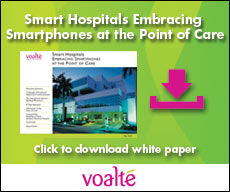 |
Special Issue: 9 Mobile Health Hospitals
 While it may seem as if a good number of care providers have shepherded mobile health services – piloted them – at their facilities, the truth is very few have officially announced mobile health pilots. During the past year and a half, MobiHealthNews has written about fewer than a dozen care providers that have piloted mobile health apps, devices or services – some have adopted them or launched them, but few have discussed the aid they have provided to this growing industry. While it may seem as if a good number of care providers have shepherded mobile health services – piloted them – at their facilities, the truth is very few have officially announced mobile health pilots. During the past year and a half, MobiHealthNews has written about fewer than a dozen care providers that have piloted mobile health apps, devices or services – some have adopted them or launched them, but few have discussed the aid they have provided to this growing industry.
In the spirit of giving credit where credit is due, we have compiled this list of nine “mobile health hospitals” that have worked with startups and others in the mobile health industry to hone services, devices and applications not yet in the market.
This is by no means a comprehensive list, but it’s also fairly objective: These are the care providers who have announced mobile health pilot programs. (We’re sure there are others who have remained quiet, but if we missed any, be sure to send me a note at brian.dolan@mobihealthnews.com)
The nine mobile health hospitals detailed below have lent a hand to wireless health startups across the spectrum of devices and services, including text message reminders, wireless peel-and-stick vital sign monitoring, wireless implantable devices and much, much more. These are nine care providers worth recognizing as their support for and publicity of mobile health helps many more than the startups and vendor partners they worked with directly. Their willingness to share their interest in mobile health raises all boats.
Read on for more about the 9 Mobile Health Hospitals, (which are in no particular order)…
|

Stanford tinkers with iPhone EMRs
Care Facility: Stanford Hospital & Clinics
Location: Palo Alto, California
Vendor Partners: Epic Systems, Apple
Last fall Stanford Hospital and Clinics, in Palo Alto, California, began a trial with Apple and Epic Systems to test software that aimed to enable medical staff to access patient charts on Apple’s iPhone. Stanford Hospital told the Wall Street Journal that it was investigating ways to use iPhones to reduces errors and increase patient care as patients move from one doctor to the next. By January details about Epic Systems’ partnership with Apple for a mobile phone-based electronic health record (EHR) application came out: Epic’s iPhone application, called Haiku, became available on Apple’s AppStore.
“Haiku provides authorized clinical users of Epic’s Electronic Health Record with secure access to clinic schedules, hospital patient lists, health summaries, test results and notes. Haiku also supports dictation and In Basket access. Haiku works on both the iPhone and iPod touch,” according to the app’s description on the AppStore. (More)
|

 |

Mt. Sinai texts liver transplant patients
Care Facility: Mt. Sinai Hospital
Location: New York, New York
Vendor Partner: CareSpeak
“If we can save one patient from needing another transplant, we’ve saved a life and at least a half-million dollars. The investment is relatively little and the benefit enormous.” Dr. Tamir Miloh, assistant professor of pediatrics and surgery at Mount Sinai Hospital in New York. The investment? Text message reminders for teenage liver transplant patients.
Miloh and his team at Mt. Sinai worked on a pilot program with with CareSpeak that aimed to increase the rate of adherence among young liver transplant patients to their medication regimen. The medication schedules for the program’s 41 patients ranged from three different pills once a day to three different pills twice a day.
According to a report in the journal, Pediatrics, investigators concluded that the text message reminders did in fact increase adherence to regimens, but more importantly it led to better outcomes: While 12 of the 41 patients had experienced rejection episodes during the year before starting the program, only two patients had such an episode during the program. (More)
|

Meridian tests consumer health waters
Care Facility: Meridian Health
Location: Neptune, New Jersey
Partner: Best Buy
New Jersey healthcare facility Meridian Health worked together with their local Best Buy store to assess whether consumers are comfortable buying connected health devices at a big box electronics store.
“We have spent a significant amount of time over the last few months working with Best Buy,” Meridian Health’s Sandra Elliott said. “Meridian is very comfortable in the understanding that as health system we know a lot about care, but not a lot about retail. Most people will or do feel very comfortable about going to Best Buy and looking at consumer electronics. Given the fact that a number of consumer medical devices are available through other retail stores, we wondered whether Best Buy was a potential opportunity.”
Elliott said that Best Buy and Meridian conducted mystery shopping runs and focus groups to gauge interest.
“It has been an interesting journey,” Elliott said. “With the initial focus groups and mystery shopping, people felt very comfortable that they could get devices commonly found at CVS, Walgreens and even WalMart at a Best Buy, too. These are devices like blood pressure cuffs, glucometers and similar ones.” (More)
|

Sarasota Memorial pilots mobile service for nurses
Care Facility: Sarasota Memorial Hospital
Location: Sarasota, Florida
Vendor Partners: Voalte
Voalte announced a collaborative agreement with Sarasota Memorial Hospital that saw the care facility’s nurses using Voalte’s iPhone-based voice, alarm and text offering. The service allows Sarasota Memorial’s nurses to send and receive text messages, make voice calls, and receive critical care alarms through iPhones in an effort to provide faster response times for patients. The hospital began piloting the Voalte service in June 2009.
Voalte structured the partnerships as a ‘development partner relationship,’ which sees Sarasota Memorial providing Voalte with a lot of information about how the solution needs to be built and what different functionality and features nurses and physicians are looking for in a communications platform. The version of Voalte One that Sarasota Memorial piloted included a feedback loop that allowed nurses to tell the team at Voalte (in real-time) what they thought about the service. (More)
|

Partners tests out blood pressure tracking
Care Facility: Partners Healthcare
Location: Boston, Massachusetts
Vendor Partner: SmartBeat/HopSkipConnect
While it was still part of Partners Healthcare, HopSkipConnect was better known as SmartBeat, and it piloted its service with EMC. EMC tested the company’s blood pressure management offering back in 2008. The program tested 404 people — 202 were in the control group and the other half had a blood pressure cuff and a modem, an iMetrikus device. Three times a week the 202 participants uploaded BP data to the Web and checked in on-line once a week. Only three people out of the 202 dropped out of the program. Almost 70 percent of the group demonstrated an improvement, while 55 percent brought their blood pressure into a controlled range.
EMC calculated the ROI on the program as 3 to 1, so they decided to roll it out nationwide to its employees, which it is doing with HopSkipConnect today. (More)
|

St. Francis pilots a wireless pacemaker
Care Facility: St. Francis Hospital
Location: Roslyn, New York
Vendor Partner: St. Jude Medical
A patient at St. Francis Hospital in Rosyln, New York, Carol Kasyjanski, 61, was the first recipient of St. Jude Medical’s wireless-enabled pacemaker, which the FDA approved in July. Kasyjanksi’s routine check-ups are significantly shorter now because the doctor can finish about 90 percent of the work before she arrives thanks to the data transmitted from the pacemaker to its online portal.
Dr. Steven Greenberg, the director of St. Francis’ Arrhythmia and Pacemaker Center, said the new technology would likely become the gold standard for pacemakers. The remote monitoring device connects to the server “at least” once a day to upload data or any alerts.
“In the future, these pacemakers may be placed not just for people with slow heartbeats. We may be monitoring high blood pressure, we may be measuring glucose, we may be monitoring heart failure,” Greenberg said. ”There are literally dozens of physiological parameters that now, with this wireless technology, we can leverage for the future of monitoring. So it is not just a rhythm monitor but a disease monitor.” (More)
|

St. Mary’s tests peel-and-stick vital sign monitoring
Care Facility: St. Mary's Hospital
Location: London, United Kingdom
Vendor Partner: Toumaz Holdings
UK-based wireless body area monitoring company Toumaz conducted a clinical trial of its peel-and-stick body monitoring system, Sensium, at London’s St. Mary’s Hospital. Toumaz’s U.S. partner CareFusion is sponsoring the trial.
Toumaz’s Sensium wireless band-aids continuously monitor patients’ vital signs, including skin temperature, heart rate and respiration.
Toumaz founder Chris Toumazou described the company’s plans in a recent press release: “The business case is simple: by using the disposable digital plaster to monitor on a 24-7 basis, critical medical information can be monitored that would not otherwise have been detected. This preventative form of medicine will mean that less people could require intensive care in the future, saving lives and at the same time providing greater efficiencies and cost savings to the NHS. Once proven in a hospital setting then the digital plaster can be deployed in the home in the same way.”
Dr. Stephen Brett, a Consultant in Intensive Care Medicine at Imperial College Healthcare NHS Trust and an Honorary Senior Lecturer at Imperial College London, who is leading the trial, explained the company’s benefit to patients in the press release: “This technology has the potential to improve the capturing of patient’s vital signs within all areas of the hospital – enabling key physiological data to be acquired at an increased frequency, with the minimum of inconvenience to patients, and without the requirement to connect patients to immobile pieces of equipment. This raises the possibility of technology: improving hospital safety systems; enhancing the efficiency of adding vital sign data to patient records: and potentially freeing valuable nursing staff time for other patient care responsibilities.” (More)
|

Mayo monitors vital signs at home
Care Facility: Mayo Clinic
Location: Rochester, Minnesota
Vendor Partners: GE Healthcare, Intel
For the project, Intel brings its Health Guide into the mix; GE offers a comprehensive portfolio of medical, digital, and bio/clinical products; and, Mayo brings its clinical expertise and, most importantly, patients who are managing chronic diseases. The pilot includes 200 high-risk Mayo Clinic patients served by the Rochester, Minnesota, provider. These patients will monitor vital signs on a daily basis through the Health Guide technology. The platform allows for videoconferencing between the patient at home and the care team back at Mayo to permit patient-provider connectivity.
The aim is to learn about home health monitoring’s challenges and opportunities in real-life, with real people. The project goal is to evaluate the effectiveness of daily in-home monitoring technology measured in 2 ways: reduced hospital admissions and reduced visits to the emergency room. (More)
|

Princeton Baptist tests wireless hand hygiene monitoring
Care Facility: Princeton Baptist Medical Center
Location: Birmingham, Alabama
Vendor Partner: Proventix Systems
Princeton Baptist Medical Center piloted nGage, a wireless-enabled, hand hygiene compliance system, made by Proventix Systems. The pilot incorporated a smart, touchless system that monitored hand hygiene compliance. The caregiver wears a radio-frequency ID badge that monitors whether or not the worker engaged in hand hygiene prior to and after entering a patient room.
"Hand hygiene -- or hand washing – is key to fighting the spread of infectious diseases, such as Swine Flu," said Gloria Dietz, R.N., nurse manager of the surgical unit where the 12-week study was implemented in December. "In the health care environment, we heal with our hands – changing dressings, giving medications, taking vitals. Hand hygiene is critically important to reduce the spread of infection. And even when our track record is good, we always want to improve care to our patients. That’s what this pilot will do by electronically compiling information to show us where we can improve." (More)
|

|
| 9 Mobile Health Hospitals |
 |
 |
 |
Mayo spins out an app developer startupBy Brian DolanWhile it's not a pilot, mRemedy, a spinoff startup from the Mayo Clinic, launched earlier this year marking a unique show of enthusiasm for mobile health from a care provider. Sure, others have launched mobile medical apps, but Mayo's move to spin out a startup focused on them looks to be a singular event. Mayo partnered with application developer DoApps to form mRemedy, which is focused on creating health apps for smartphones. mRemedy’s apps will be based on Mayo Clinic’s research and services. The first mRemedy app, Mayo Clinic Meditation, launched for Apple’s iPhone and iPod touch. The app, which teaches users relaxation and breathing techniques costs $4.95 and is based on a program created by Mayo professor Dr. Amit Sood.Mayo believes that mRemedy will help distribute its products beyond the traditional care setting and will generate revenue thanks to the booming smartphone apps market. While other care providers launched smartphone apps during the quarter or partnered for chronic disease management programs, Mayo and the Center for Connected Health, which spun out its own mobile health startup HopSkipConnect, are unique for spinning out startups focused on these two areas of mobile health.
|
|
 |
 |
|
